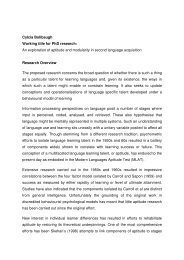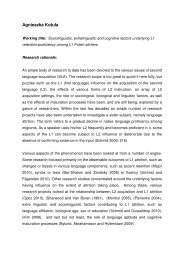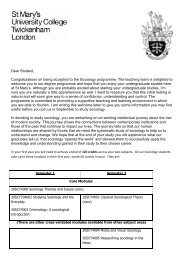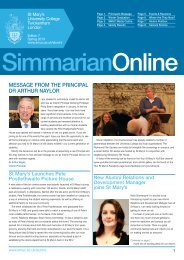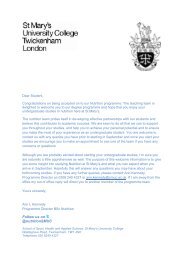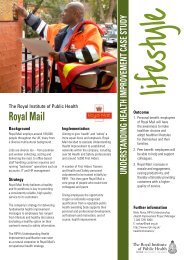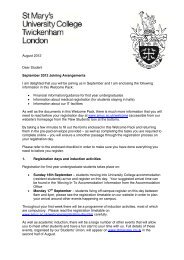Procurement Manual - St Mary's University College
Procurement Manual - St Mary's University College
Procurement Manual - St Mary's University College
Create successful ePaper yourself
Turn your PDF publications into a flip-book with our unique Google optimized e-Paper software.
<strong>Procurement</strong> <strong>Manual</strong><br />
<strong>St</strong> Mary’s <strong>University</strong> <strong>College</strong> <strong>Procurement</strong> <strong>Manual</strong>, May 2008
TABLE OF CONTENTS<br />
1. INTRODUCTION<br />
2. STRUCTURE OF THE PROCUREMENT ORGANISATION AND<br />
SERVICE DELIVERY<br />
3. PROCUREMENT PRINCIPLES<br />
4. PROCUREMENT CYCLE<br />
5. REQUIREMENT SCRUTINY (DETERMINING THE NEED)<br />
6. AUTHORITY TO PROCURE<br />
7. PROCUREMENT ROUTES<br />
8. COMPETITION/SOLE SOURCING<br />
9. EU PROCUREMENT REGULATIONS<br />
10. SUPPLIER SELECTION<br />
11. INVITATION TO TENDER<br />
12. TENDER RECEIPT AND TREATMENT<br />
13. TENDER EVALUATION<br />
14. PRE CONTRACT<br />
15. CONTRACT AWARD<br />
16. LOWER VALUE REQUIREMENTS<br />
17. ADDED VALUE REPORTING<br />
18. CONTRACT MANAGEMENT<br />
19. CONTRACT AMENDMENT<br />
20. CONTRACT COMPLETION<br />
<strong>St</strong> Mary’s <strong>University</strong> <strong>College</strong> <strong>Procurement</strong> <strong>Manual</strong>, May 2008
21. OTHER CONTRACTUAL/PROCUREMENT ISSUES<br />
22. BUSINESS RELATIONSHIPS<br />
<strong>St</strong> Mary’s <strong>University</strong> <strong>College</strong> <strong>Procurement</strong> <strong>Manual</strong>, May 2008
1 INTRODUCTION<br />
1.1 The purpose of this <strong>Manual</strong> is to provide detailed guidance and best<br />
practice to <strong>St</strong> Mary’s staff on managing individual procurements. The<br />
contents of this <strong>Manual</strong> apply to the purchase of all goods and services for<br />
the <strong>University</strong> <strong>College</strong>. This <strong>Manual</strong> is the key document for<br />
implementing the <strong>University</strong> <strong>College</strong> <strong>Procurement</strong> <strong>St</strong>rategy and ensuring<br />
compliance with the <strong>University</strong> <strong>College</strong> Financial Regulations. Forms and<br />
templates for documents referred to in this <strong>Manual</strong> and the <strong>University</strong><br />
<strong>College</strong> <strong>Procurement</strong> <strong>St</strong>rategy, can be found on the <strong>Procurement</strong> Website :<br />
http://portal.smuc.ac.uk/procurement.html . Any queries regarding<br />
the contents of this <strong>Manual</strong> and any requests for specific guidance<br />
should be addressed to omanen@smuc.ac.uk or<br />
withersi@smuc.ac.uk.<br />
2 STRUCTURE OF THE PROCUREMENT ORGANISATION AND<br />
SERVICE DELIVERY<br />
2.1 The <strong>University</strong> <strong>College</strong>’s <strong>Procurement</strong> <strong>St</strong>rategy is owned by the<br />
Director of Finance. The Director of Finance is responsible for the<br />
delivery of an effective cycle for the acquisition of goods, materials<br />
and services together with the provision of a policy-making,<br />
advisory and monitoring service. The Director of Finance also acts<br />
as focal point for general procurement issues and escalation of<br />
specific procurement problems. The Director of Finance is the final<br />
arbiter on all matters relating to procurement at the <strong>University</strong><br />
<strong>College</strong>.<br />
2.2 Individual procurements, operating in accordance with the<br />
<strong>Procurement</strong> <strong>St</strong>rategy and related processes/regulations (e.g.<br />
Financial Regulations), are devolved to local users/buyers in<br />
schools and departments.<br />
3 PROCUREMENT PRINCIPLES<br />
3.1 The <strong>University</strong> <strong>College</strong> is committed to a rigorous procurement<br />
process which emphasises the principles of:<br />
<strong>St</strong> Mary’s <strong>University</strong> <strong>College</strong> <strong>Procurement</strong> <strong>Manual</strong>, May 2008
• Value for money<br />
• Competitive tendering<br />
• Sustainability<br />
• Transparency<br />
• Fairness & equality<br />
• Best practice<br />
• Legality (e.g. in accordance with EU <strong>Procurement</strong> Regulations)<br />
• Confidentiality, subject to the Freedom of Information Act<br />
These principles should underpin all <strong>University</strong> <strong>College</strong><br />
procurements.<br />
3.2 In order for the procurement process to be rigorous, it is important<br />
that all assessments, discussions and decisions are fully<br />
documented and filed together with all correspondence with<br />
potential suppliers.<br />
4 PROCUREMENT CYCLE<br />
4.1 The procurement cycle consists of a number of generic stages that<br />
are common to all procurements and a number of additional stages<br />
relating to more complex and higher value procurements. The<br />
generic stages are :<br />
• Determining the need to procure (requirement scrutiny)<br />
• Establishing authority to procure<br />
• Establishing the procurement route (type of contract)<br />
• Determining availability of potential suppliers (competition)<br />
• Inviting quotes/tenders<br />
• Evaluation of quotes/tenders<br />
• Awarding the contract<br />
• Managing the contract (including contract closure/disposal).<br />
• Receiving and paying for goods and services<br />
5 REQUIREMENT SCRUTINY (DETERMINING THE NEED)<br />
5.1 As part of requirement scrutiny, staff engaged on procurement<br />
should attempt to identify procurement risks and ensure risk<br />
management techniques have been applied where appropriate.<br />
Examples of procurement risks include dependencies on other<br />
goods/services, supplier risks (non-performance, bankruptcy, etc),<br />
payment risks where advances of the contract price have been<br />
<strong>St</strong> Mary’s <strong>University</strong> <strong>College</strong> <strong>Procurement</strong> <strong>Manual</strong>, May 2008
made (pre payments, milestones, etc), intellectual property (IP)<br />
risks (risk of third party infringements, etc).<br />
5.2 As part of requirement scrutiny, staff engaged on procurement<br />
should ensure that the total cost of ownership has been calculated<br />
using whole life cost models/techniques. Total cost of ownership will<br />
include “hidden” costs like design changes and longer term costs<br />
such as spares, maintenance and disposal. Some suppliers will sell<br />
equipment at a lower price in order to make their profit on aftersales<br />
services – accordingly all pricing elements should be taken<br />
into account in the value of the requirement and, later, during tender<br />
evaluation.<br />
5.3 As part of requirement scrutiny, staff engaged on procurement<br />
should consider using internal items (in-house stock) and/or<br />
second-hand items and consider if the need is being met elsewhere<br />
within the <strong>University</strong> <strong>College</strong> before considering external<br />
procurement.<br />
5.4 As part of requirement scrutiny, staff engaged on procurement<br />
should consider the environmental impact of the goods or services<br />
they are procuring. In particular procurement from sustainable<br />
sources should be considered, as should the likely waste disposal<br />
issues and regulations (e.g. the WEEE Directive) when the<br />
procured goods reach the end of their useful life. Specifically, the<br />
following issues should be considered (this list is not in order of<br />
priority :<br />
• Energy usage including mains water and drainage water<br />
• Waste minimisation; process efficiencies and re-cycling<br />
opportunities<br />
• Waste disposal implications, hazards and costs<br />
• Avoidance of ozone-depleting substances<br />
• Reduction of volatile organic compounds<br />
• Reduction of materials containing heavy metals<br />
• Control of discharges into air, land and water<br />
• Noise levels generated from plant and machinery<br />
• Space available to house/site equipment<br />
5.5 As part of requirement scrutiny, staff engaged on procurement<br />
should consider general equality issues specific to individual<br />
procurements. The gender, disability and racial equality duties apply to<br />
services or works which are carried by third parties as well as those which<br />
are carried out directly by the <strong>University</strong> <strong>College</strong> itself. The legal liability<br />
<strong>St</strong> Mary’s <strong>University</strong> <strong>College</strong> <strong>Procurement</strong> <strong>Manual</strong>, May 2008
for the duty in relation to those works or services remains with the<br />
<strong>University</strong> <strong>College</strong>. If the <strong>University</strong> <strong>College</strong> is considering letting a<br />
contract for services or for works, it should therefore ensure that the<br />
companies it contracts with are equal opportunities employers and do not<br />
discriminate on the grounds of their race or disability, sex, gender identity,<br />
marital, family or part-time status. The relevance of equality issues to a<br />
specific procurement contract should be identified at the beginning<br />
of a procurement, when identifying need and setting the business<br />
case, and reflected as necessary in the contract notice and contract<br />
documents, including the technical specifications and the terms and<br />
conditions of the contract, in accordance with UK and EU<br />
procurement rules.<br />
6 AUTHORITY TO PROCURE<br />
6.1 Authority to procure has been delegated to the Budget Holders and<br />
their nominees on a <strong>University</strong> <strong>College</strong>-wide basis. These persons<br />
may be referred to as Authorised Signatories and should be<br />
registered with the Director of Finance in accordance with Financial<br />
Regulations.<br />
6.2 Only Authorised Signatories can commit the <strong>University</strong> <strong>College</strong> to<br />
expenditure and only once funding has been secured.<br />
6.3 All expenditure over £50 must be on an official order form and must<br />
be counter-signed by the Budget Holder (plus the Financial<br />
Accountant where the Budget Holder is also the requestor).<br />
6.4 All orders over £2,500 must be counter-signed by the Financial<br />
Accountant.<br />
6.5 All expenditure in excess of £5,000 must be authorised by the<br />
Principal or Director of Finance.<br />
6.6 The <strong>University</strong> <strong>College</strong> will not accept liability for the payment of<br />
any invoice for goods or service supplied against an order, which<br />
has not been properly authorised.<br />
6.7 It is the responsibility of the Authorised Signatory to ensure that the<br />
potential supplier’s Conditions of Sale do not conflict with the<br />
<strong>University</strong> <strong>College</strong>’s Terms and Conditions of Business.<br />
<strong>St</strong> Mary’s <strong>University</strong> <strong>College</strong> <strong>Procurement</strong> <strong>Manual</strong>, May 2008
6.8 Under no circumstances shall the <strong>University</strong> <strong>College</strong>’s Terms<br />
and Conditions of Business be compromised or varied in any<br />
manner without prior written authority from the Director of<br />
Finance.<br />
7 PROCUREMENT ROUTES<br />
7.1 Before considering potential suppliers, the optimum procurement<br />
route (which might affect the choice of suppliers) needs to be<br />
selected. Generally the procurement route options will be either via<br />
a framework agreement or via a bespoke procurement.<br />
7.2 Framework agreements are those set up for particular commodities,<br />
against which call-offs can be made without resorting to further<br />
competition. Where a framework agreement is in place for a<br />
particular commodity, it should be considered as the first resort for<br />
all such commodity requirements. The holders of such framework<br />
agreements should be considered as Preferred Suppliers.<br />
However where the requirement can not be met via the framework<br />
agreement, or the <strong>University</strong> <strong>College</strong> believes that better value for<br />
money can be obtained via an alternative procurement route, then<br />
use of the framework can be waived. Note, where there is a choice<br />
between multiple framework suppliers, such as those placed by an<br />
external body (SUPC, OGC, etc), the <strong>University</strong> <strong>College</strong> will<br />
generally select a sole framework supplier best meeting the<br />
<strong>University</strong> <strong>College</strong>’s needs, in conformance with the EU<br />
<strong>Procurement</strong> Regulations. The <strong>University</strong> <strong>College</strong> is a member of<br />
the Southern Universities Purchasing Consortium (SUPC) and<br />
generally supports use of SUPC frameworks subject to the above<br />
provisions. For detailed guidance on framework agreements,<br />
contact <strong>Procurement</strong> Department.<br />
7.3 Bespoke procurements are one-off, individual procurements with<br />
tailored terms and conditions. The degree of bespoking will vary<br />
depending on value and complexity – for simple procurements<br />
below £25,000, an official order calling up <strong>University</strong> <strong>College</strong><br />
standard terms and conditions will usually suffice.<br />
8 COMPETITION/SOLE SOURCING<br />
8.1 Competition is a cornerstone of public sector procurement and<br />
needs to be considered for each and every requirement, unless a<br />
pre-competed route (e.g. a framework agreement) exists. In<br />
<strong>St</strong> Mary’s <strong>University</strong> <strong>College</strong> <strong>Procurement</strong> <strong>Manual</strong>, May 2008
assessing whether or not competition is practicable, a number of<br />
factors needs to be considered :<br />
• Value of requirement/thresholds for competition<br />
• Timescales of the requirement<br />
• Technical complexity (ability to specify requirement, proprietary/IP<br />
issues)<br />
• Market for competition (capability, capacity)<br />
8.2 Thresholds<br />
8.2.1 Competition should always be considered for the higher value<br />
requirements covered by this <strong>Manual</strong>. Where the requirement<br />
exceeds, or is likely to exceed, £140,000 in value, competition<br />
should be conducted in accordance with EU <strong>Procurement</strong><br />
Regulations (see Chapter 9, below). Where there is a valid case for<br />
sole sourcing, competition may be dispensed with. However such a<br />
case must be robust, defensible against challenge from other<br />
potential suppliers and provide demonstrable value for money<br />
(VFM).<br />
8.2.2 For lower value requirements, competition should still be<br />
considered though the degree of formality can be varied according<br />
to value i.e. :<br />
Value Degree of Formality Minimum No.<br />
£140,000+ Advert and formal tenders 5<br />
£25,000-£139,999 Formal tenders 3<br />
£5,000-£24,999 Written quotations 3<br />
£50-£4,999 Telephone quotations 1*<br />
Below £50 Petty cash N/A<br />
*3 quotes recommended<br />
8.2.3 Any discussions and or correspondence prior to an offer of contract<br />
or contract amendment should be on a “without commitment” basis<br />
and this phrase should be clearly stated on any such<br />
<strong>St</strong> Mary’s <strong>University</strong> <strong>College</strong> <strong>Procurement</strong> <strong>Manual</strong>, May 2008
correspondence. The contract offer/amendment letter should be<br />
the only point at which commitment is made.<br />
8.3 Timescales<br />
8.3.1 Time factors alone will not ordinarily be sufficient for dispensing with<br />
competition. There are relatively quick methods of conducting<br />
competition, whether via informal, methods (telephone/fax quotes)<br />
or via EU <strong>Procurement</strong> Regulations (e.g. the accelerated<br />
procedures). However the need to meet strict timescales can be<br />
used as an evaluation criterion, its weighting increasing the more<br />
urgent the requirement (see Chapter 13 below). In some cases it<br />
may be obvious that only one supplier can meet genuinely urgent<br />
timescales, in which case sole sourcing may be appropriate. In<br />
other cases, timescales should form part of the competitive<br />
process.<br />
8.4 Technical Complexity<br />
8.4.1 Some requirements are very complex and competition may not be<br />
possible where proprietary rights exist and where there is no<br />
equivalent solution.<br />
8.5 Market for Competition<br />
8.5.1 Lack of alternative capability/capacity/quality in the marketplace<br />
might be sufficient grounds for dispensing with competition.<br />
However this needs careful research and it might be appropriate for<br />
an informal approach to be made to potential suppliers to enquire<br />
about their willingness and ability to bid for a possible requirement.<br />
8.6 Small and Medium Sized Enterprises (SMEs)<br />
8.6.1 SMEs are often local businesses and therefore any assistance to<br />
them can bring benefits to the local community and enhance the<br />
<strong>University</strong> <strong>College</strong>’s reputation with the local community.<br />
8.6.2 Whilst it is illegal to unfairly award contracts to SMEs, it is possible<br />
to legitimately help them by sometimes separating large<br />
procurements into lots and giving fair consideration to the<br />
advantages provided by SMEs when formulating evaluation criteria<br />
and bid lists.<br />
<strong>St</strong> Mary’s <strong>University</strong> <strong>College</strong> <strong>Procurement</strong> <strong>Manual</strong>, May 2008
8.7 Competition as Default<br />
8.7.1 Each case should be treated on its merits within an overarching<br />
presumption that competition is the default position.<br />
8.8 Sole Suppliers<br />
8.8.1 Where competition is impracticable, for one of the reasons detailed<br />
above, a sole supplier may be selected.<br />
8.8.2 Reasons for selecting a sole supplier must be clearly documented<br />
and will be considered as part of the approval process (see Chapter<br />
6 above).<br />
The following chapters (9 to 15) relate to high value procurements<br />
(those valued at £25,000 and over). Chapter 16 deals with lower value<br />
requirements.<br />
9 EU PROCUREMENT REGULATIONS<br />
9.1 Part A/B<br />
9.1.1 The EU Regulations refer to Part A Services and Part B Services.<br />
These are categories of services detailed in Schedule A. Part A<br />
Services are mandatory (have to be advertised) and more tightly<br />
controlled by the legislation. Part B Services are discretionary as to<br />
whether they are advertised and the ‘spirit’ of the legislation is<br />
followed but you must publish an ‘award notice’ for any contract<br />
awarded over the thresholds within Part B Services.<br />
9.2 Commodity Codes<br />
9.2.1 Commodity codes are groupings of products and groupings of<br />
services with similar characteristics or groupings of work activities<br />
(building/civil engineering) which perform a separate economic and<br />
technical function and which the <strong>University</strong> <strong>College</strong> purchases by<br />
way of contracts or other purchasing arrangements. The way in<br />
which these groupings are determined impacts on the number of<br />
contracts which are subject to European procurement legislation as<br />
the spend for purchases/contracts for each commodity code is<br />
compared against the published thresholds to say when the<br />
Regulations must be applied (See Aggregation – 9.4). Commodity<br />
<strong>St</strong> Mary’s <strong>University</strong> <strong>College</strong> <strong>Procurement</strong> <strong>Manual</strong>, May 2008
codes are used within the <strong>University</strong> <strong>College</strong> purchasing system<br />
and are generic codes used by the Higher Education sector.<br />
9.3 Thresholds<br />
9.3.1 Thesholds are defined in the European <strong>Procurement</strong> Regulations<br />
(and in the UK The Public Contracts Regulations 2006 as<br />
amended) in ECU (European Currency Units). The value of the<br />
ECU is assessed every two years and published in the Official<br />
Journal of the European Union (OJEU).<br />
9.4 Aggregation<br />
9.4.1 The EU Directives require that public bodies, such as Universities,<br />
aggregate the value of their Supplies, Services and Works<br />
contracts/purchases to establish whether or not these are subject to<br />
the full application of the Regulations and whether the publication of<br />
a Periodic Indicative Notice is required.<br />
9.4.2 Aggregation is the process which involves estimating and totalling<br />
the <strong>University</strong> <strong>College</strong>’s spend on purchase/contracts for individual<br />
Supplies, Services and Works Commodity Codes. These<br />
aggregated values are then compared with the appropriate<br />
published threshold values. Where the aggregated spend exceeds<br />
these values, the Regulations must be applied.<br />
9.5 General Rules on Aggregation<br />
9.5.1 Aggregated values are calculated exclusive of Value Added Tax.<br />
9.5.2 Aggregated values must be calculated to the highest potential<br />
contract value i.e. it should include the value of anticipated<br />
variations, contract amendments and options.<br />
9.5.3 Contracts must not be split to avoid the regulations. However<br />
contracts that are covered by the regulations (through aggregation<br />
or otherwise) may subsequently be advertised as separable lots.<br />
9.5.4 The value of all contracts for a commodity code must be taken into<br />
account.<br />
9.5.5 If the contract period is greater than 12 months then the value is<br />
calculated by totalling the spend over the whole contract period.<br />
9.5.6 If the commodity group has no previous history then the estimated<br />
expenditure for the commodity group during the 12 month period<br />
<strong>St</strong> Mary’s <strong>University</strong> <strong>College</strong> <strong>Procurement</strong> <strong>Manual</strong>, May 2008
following the first delivery date is used to calculate the value.<br />
(Again, if a contract is let for a period of greater than 12 months<br />
then the value is calculated as the total estimated expenditure over<br />
the whole contract period.)<br />
9.6 Award Procedures<br />
9.6.1 The main award procedures under the EU <strong>Procurement</strong><br />
Regulations are the Open, Restricted, Negotiated and Accelerated<br />
Procedures.<br />
9.6.2 The Open procedure is unlikely to be used by the <strong>University</strong><br />
<strong>College</strong> as there is no control over the number of tenders<br />
submitted. Any proposal to use the Open procedure, for example,<br />
where there are known to be few suppliers in the market, should be<br />
referred to the Director of Finance for prior approval.<br />
9.6.3 Under the Restricted procedure, only those companies shortlisted<br />
by the <strong>University</strong> <strong>College</strong> may submit tenders and, for this reason,<br />
the Restricted procedure is the default procedure for the <strong>University</strong><br />
<strong>College</strong>. Guidance on shortlisting is contained in Chapter 10, below.<br />
In terms of numbers on the shortlist, a range may be stated in the<br />
OJEU advertisement e.g. between 5 and 10. However the<br />
advertisement must not state less than 5 or more than 20. Where a<br />
range is not mentioned, sufficient companies (i.e. between 5 and<br />
20) must be shortlisted to ensure genuine competition. Of course, if<br />
less than 5 fulfill the shorlisting criteria, then a lower number is<br />
allowable. Timescales for the Restricted procedure are at least 37<br />
days from issue of advertisement for expressions of interest (30<br />
days if issued electronically) and at least 40 days from date of issue<br />
of ITT to tender return date. See Chapter 15 for contract award<br />
guidance.<br />
9.6.4 Under the Negotiated procedures, the <strong>University</strong> <strong>College</strong> may<br />
consult with selected suppliers and negotiate directly with them.<br />
This may be with or without a call for competition, depending on the<br />
circumstances. When a call for competition is made, the competitive<br />
dialogue procedure may be followed. However given that the use of<br />
the negotiated procedure is strictly limited, and is likely to be<br />
applicable only to high value/complexity procurements, any<br />
proposal to use this procedure must be referred to the Director of<br />
Finance for prior approval.<br />
9.6.5 The Accelerated procedure allows the above procedures to be<br />
speeded up in the case of extreme urgency and where the<br />
<strong>St</strong> Mary’s <strong>University</strong> <strong>College</strong> <strong>Procurement</strong> <strong>Manual</strong>, May 2008
circumstances are outside of the <strong>University</strong> <strong>College</strong>’s control (i.e.<br />
not for lack of foresight/planning) e.g. the 37 days for expressions of<br />
interest under the Restricted procedure may be shortened to 15<br />
days (10 days if issued electronically) and the 40 days for tender<br />
submission may be shortened to 10 days.<br />
9.6.6 Iterative tendering is an acceptable part of the Negotiated<br />
procedure and may be desirable for a procurement under the<br />
Restricted procedure. However, given the risks involved, any<br />
iterative tendering under EU <strong>Procurement</strong> Regulations must be with<br />
the prior approval of the Director of Finance. See also Chapter 14.<br />
9.6.7 Post tender negotiation on price is specifically ruled out under the<br />
Open and Restricted procedure – only clarification discussions may<br />
be carried out. Given the risks involved, any post tender<br />
negotiations under EU <strong>Procurement</strong> Regulations must be with the<br />
prior approval of the Director of Finance. See also Chapter 14.<br />
9.7 Advertisements<br />
9.7.1 Most requirements covered by the EU <strong>Procurement</strong> Regulations will<br />
need to be advertised in the OJEU. Some requirements, known as<br />
Part B requirements, do not need to be advertised in the OJEU but<br />
they may be advertised elsewhere e.g. on www.tenders.ac.uk or the<br />
<strong>University</strong> <strong>College</strong>’s website. For detailed guidance on advertising<br />
requirements, contact omanen@smuc.ac.uk or<br />
withersi@smuc.ac.uk.<br />
10 SUPPLIER SELECTION<br />
10.1 Elements of Supplier Selection<br />
10.1.1 When selecting potential suppliers to tender for requirements, a<br />
number of elements must be considered and checked :<br />
• Criteria for selection (including provisions of new EU Directive)<br />
• Pre Qualification<br />
• Financial/credit checks<br />
• Past performance<br />
<strong>St</strong> Mary’s <strong>University</strong> <strong>College</strong> <strong>Procurement</strong> <strong>Manual</strong>, May 2008
• Grave misconduct/criminal conviction e.g. serious findings against a<br />
potential supplier in an Employment Tribunal or Court, money<br />
laundering conviction.<br />
10.2 Selection Criteria<br />
10.2.1 A number of selection criteria may be used to pre-qualify potential<br />
suppliers, usually under the generic headings of Financial Capacity<br />
and Technical Capacity. An example is contained in the Toolkit<br />
section of the <strong>Procurement</strong> Website<br />
(http://portal.smuc.ac.uk/procurement.html ).<br />
10.2.2 Criteria in the former could include profitability, ratio of turnover to<br />
contract value and credit rating.<br />
10.2.3 Criteria in the latter could include previous experience,<br />
accreditations, health and safety policies.<br />
10.3 Pre-Qualification<br />
10.3.1 Pre-qualification is necessary to ensure the right type and number<br />
of suppliers are invited to tender. Use of a pre qualification<br />
questionnaire (PQQ) is recommended for larger procurements,<br />
though a thorough evaluation of a detailed Expression of Interest<br />
(EoI) might suffice. In the latter case, the OJEU must be sufficiently<br />
detailed to provide potential suppliers with enough information for<br />
them to submit a meaningful EoI.<br />
10.4 Financial/Credit Checks<br />
10.4.1 An important part of supplier selection is ensuring that all potential<br />
suppliers have the financial capacity and stability to fulfil the<br />
requirement both during and after the contract (the latter for any<br />
post-contract requirements such as warranties, further work).<br />
Financial suitability can be checked in a number of ways such as :<br />
a review of accounts submitted as part of the EoI; comparison of<br />
contract requirement with a company’s turnover to ensure the<br />
value of the work is not disproportionate to the company’s finances;<br />
credit/financial health checks obtained from Dun & Bradstreet or<br />
<strong>St</strong>andard & Poor.<br />
10.5 Past Performance<br />
10.5.1 Whilst the <strong>University</strong> <strong>College</strong> does not operate a formal vendor<br />
rating register or system, contract files from previous procurements<br />
<strong>St</strong> Mary’s <strong>University</strong> <strong>College</strong> <strong>Procurement</strong> <strong>Manual</strong>, May 2008
with suppliers might provide useful information regarding past<br />
performance. However, in the absence of a formalised process for<br />
assessing past performance, such information should be used<br />
carefully and in conjunction with other pre-qualifying information.<br />
11 INVITATION TO TENDER (ITT)<br />
11.1 Issuing the ITT<br />
11.1.1 All tenders must be invited to tender simultaneously and in writing.<br />
The EU legislation requires tenders to be issued in the fastest<br />
practicable manner.<br />
11.1.2 Whether the EU Directives are being used or not these actions are<br />
a best practice and should be applied as a matter of course.<br />
11.2 Format of the ITT<br />
11.2.1 The ITT will have a number of sections but should contain enough<br />
information in order to allow tenderers to submit compliant<br />
responses, for example:<br />
• A draft contract with terms and conditions<br />
• Award criteria, if not already issued<br />
• Likely pricing mechanisms (fixed, ascertained cost, etc) and<br />
payment terms, including any retentions/vesting issues<br />
• Specification<br />
• Guidance on the format and receipt of tenders (including intention<br />
to tender responses, treatment of late tenders, any requirement for<br />
Parent Company Guarantees, etc)<br />
• Guidance on tender clarification, amendments, pre-tender<br />
meetings, Q&As, extension of time<br />
11.2.2 The contract terms and conditions should include conditions that<br />
the contractor must comply with the anti-discrimination provisions<br />
of all equalities legislation. It should also include conditions to<br />
ensure compliance with the anti-discrimination provisions of all<br />
equalities legislation where contractors sub-contract the work to<br />
<strong>St</strong> Mary’s <strong>University</strong> <strong>College</strong> <strong>Procurement</strong> <strong>Manual</strong>, May 2008
third parties. The following wording is a guide although may be<br />
added to as appropriate:<br />
“Equalities Considerations<br />
We are an equal opportunities employer. You must also be an<br />
equal opportunities employer and comply fully with equal<br />
opportunities legislation.<br />
You will ensure that you do not discriminate against anyone<br />
unlawfully, or treat anyone unfairly, on the grounds of their race,<br />
disability sex, gender identity, marital, family or part-time status.<br />
You will also make sure that anyone acting on your behalf, your<br />
employees and sub-contractors involved in the Contract do not do<br />
so either, and that those involved in the management or operation<br />
of the Contract receive appropriate training on equal opportunities<br />
legislation and associated good practice.”<br />
<strong>St</strong> Mary’s <strong>University</strong> <strong>College</strong> <strong>Procurement</strong> <strong>Manual</strong>, May 2008
11.3 Tender Clarification and Amendments<br />
11.3.1 Tender clarification and tender amendments occur once the ITT<br />
has been issued. Tender clarification occurs through discussion<br />
between a tenderer and the <strong>University</strong> <strong>College</strong> in order to clearly<br />
identify the requirement. This does not result in any change to the<br />
ITT. The details of these clarifications should be issued to all other<br />
tenderers (unless the discussions are to clarify a tenderer’s offer, in<br />
which case it will be kept confidential to the tenderer e.g. where a<br />
minimum specification has been provided to generate innovative<br />
technical solutions). All clarifications should be numbered and<br />
dated. It is important that responses to clarifications are issued to<br />
all tenderers at the same time and within a reasonable period of<br />
time prior to return of tenders.<br />
11.3.2 Tender amendments occur when one or more elements of the<br />
tender is changed resulting in an amendment to tender documents<br />
being issued to specify the change to the original ITT requirements.<br />
Once an ITT has been issued, amendments must be issued<br />
simultaneously to all tenderers at any time prior to 6 working days<br />
before the final date for return of tenders. Consideration should be<br />
given as to whether the tender return date is then reasonable due<br />
to the additional information being issued.<br />
11.3.3 Where amendments are of a significant nature, consideration<br />
should be given to withdrawing the ITT and recommencing the<br />
tender process. Any change in the vendors invited to tender must<br />
be fully justified under the EU Directives.<br />
11.3.4 All amendments and clarifications must be issued by the<br />
<strong>Procurement</strong> Department.<br />
11.4 Extension of Time<br />
11.4.1 It is vital that tenderers are allowed adequate time to prepare and<br />
submit tenders. The time allowed must take into account the<br />
complexity and extent of documentation, pre-tender meetings and<br />
site visits.<br />
11.4.2 It may be necessary to grant an extension of time for the return of<br />
tenders for a number of reasons such as unforeseen<br />
circumstances or through tender amendments.<br />
<strong>St</strong> Mary’s <strong>University</strong> <strong>College</strong> <strong>Procurement</strong> <strong>Manual</strong>, May 2008
11.4.3 When an extension of time is being assessed, consideration must<br />
be given to the strategic and programme implications before it is<br />
granted.<br />
11.4.4 A request by a tenderer for an extension of time should only be<br />
granted if reasonable, consistent with the <strong>University</strong> <strong>College</strong>’s<br />
requirements, and at least 3 working days prior to the tender return<br />
date.<br />
11.5 Pre-Tender Meetings and Site Visits<br />
11.5.1 Pre-tender meetings and site visits are arranged by the<br />
<strong>Procurement</strong> Department in conjunction with the User Department.<br />
A pre-tender meeting or site visit may be required where the issues<br />
contained in the tender are complex or where there is an element<br />
of interpretation in the specification. These meetings are designed<br />
to clarify the exact requirements of the tender and allowable<br />
variants.<br />
11.5.2 All vendors selected to receive an ITT must be invited to attend<br />
such meetings or visits where these are part of the tendering<br />
process. This invitation must be undertaken in writing.<br />
11.5.3 Tenderers should be invited as a group, but where separate<br />
meetings or visits occur all tenderers should receive the same<br />
information.<br />
11.5.4 Minutes of meetings should be taken and circulated to all<br />
tenderers. Items confidential to individual tenderers should be<br />
treated as such. In certain circumstances, pre-tender or site visit<br />
notes can be incorporated into the tender documentation.<br />
11.6 Return of Tenders<br />
11.6.1 Prior to tender return :<br />
• Tenderers should be reminded, if necessary, of the date and time<br />
for return of tenders.<br />
• Tenderers should be permitted to submit revised tenders or written<br />
amendments at any time up to the time and date specified for the<br />
return of tenders.<br />
<strong>St</strong> Mary’s <strong>University</strong> <strong>College</strong> <strong>Procurement</strong> <strong>Manual</strong>, May 2008
12 TENDER RECEIPT AND TREATMENT<br />
12.1 Receipt of Tenders<br />
12.1.1 The date and time (if applicable) of receipt should be recorded and<br />
Tenders should then be stored in a secure location until opening.<br />
Tenders should be treated as confidential documents.<br />
12.2 Tender Opening<br />
12.2.1 Tenders must not be opened before the date and time for return of<br />
tenders specified in the ITT or such amended date and time as<br />
may have been advised to all tenderers. Tender opening must be<br />
undertaken by an individual with the appropriate authority in the<br />
presence of an independent witness.<br />
12.2.2 The ‘Tender Opening Form’ must be completed and signed upon<br />
the opening of the tenders and if a tender has not been received,<br />
this must be recorder on the ‘Tender Opening Form’.<br />
12.2.3 All pages (including copies of tenders) that refer to any financial<br />
information i.e. cost, discounts must be date stamped and signed<br />
by the responsible officer and an independent witness.<br />
12.2.4 All tenders that are related must be opened at the same time<br />
12.2.5 EU legislation requires acceptance of tenders by letter, telegram,<br />
facsimile or electronic means.<br />
12.3 Late Tenders<br />
12.3.1 Late tenders should only be accepted if the postmark/couriers<br />
delivery note indicates that they were dispatched in sufficient time<br />
to arrive by the due date.<br />
12.3.2 All unaccepted tenders should be returned to the tenderer,<br />
unopened, accompanied by an explanatory letter.<br />
12.4 Initial Checking and Non-Compliances<br />
12.4.1 Once opened, tenders should be checked to ensure they contain<br />
all relevant information and any non-compliances should be noted.<br />
Tenders may be ruled out for non-compliances.<br />
12.4.2 Part of the checking process is to ensure any honest mistakes are<br />
highlighted. For example, should an abnormally low price be<br />
<strong>St</strong> Mary’s <strong>University</strong> <strong>College</strong> <strong>Procurement</strong> <strong>Manual</strong>, May 2008
tendered, it may be a mistake and the tenderer should be<br />
contacted to confirm that the price tendered is what he intended.<br />
12.5 Distribution to User Department<br />
12.5.1 Once checked, tender documents will be distributed to the User<br />
Department for evaluation. Depending on the agreed process, this<br />
will almost certainly exclude pricing information at this stage.<br />
13 TENDER EVALUATION<br />
13.1 Process for Evaluation<br />
13.1.1 Whilst it is desirable for the evaluation process to be in place<br />
before ITTs are issued, in practice the detailed process is usually<br />
designed between issue of ITT and tender return. The process<br />
should be fair, documented, clearly understood by all and<br />
potentially releasable under Freedom of Information. Care should<br />
be taken to ensure there is no discrimination in evaluation criteria<br />
or scoring e.g. on the grounds of gender or ethnic origin. The<br />
process should include the step-by-step process for treatment of<br />
the tenders, who is involved in the process, what their<br />
responsibilities are, timescales, detailed instructions on<br />
conduct/scoring/ communications/security, etc.<br />
13.2 Scoring/Weighting<br />
13.2.1 If an EU procurement, the headline scoring/weighting criteria (i.e.<br />
ranked criteria or range of weightings) will already have been<br />
advertised in the OJEU and/or the ITT. Detailed scoring/weighting<br />
criteria, consistent with any advertised criteria, need to be devised<br />
and agreed before tenders are returned. The value/complexity of<br />
the procurement will determine the level of granularity of the<br />
scoring/weighting. All scoring/weighting systems will include price,<br />
quality and delivery but more detailed systems might also include<br />
whole life costs, relationship fit, after sales service, reliability,<br />
innovation, added value, future proofing, etc. A scoring/weighting<br />
example is contained in the Toolkit section of the <strong>Procurement</strong><br />
Website (http://portal.smuc.ac.uk/procurement.html ).<br />
13.2.2 Scoring should be carried out independently of other scorers (even<br />
when in scoring teams) except where there is a moderator or<br />
controller who can independently advise on (though not influence)<br />
scoring issues. Scorers (or scoring teams) may only score certain<br />
<strong>St</strong> Mary’s <strong>University</strong> <strong>College</strong> <strong>Procurement</strong> <strong>Manual</strong>, May 2008
aspects of tenders e.g. the commercial response or the technical<br />
response. Scoring should always be objective and limited to the<br />
tender response. Scores should be kept confidential until they are<br />
assimilated.<br />
13.3 Assimilation of Evaluation Outputs<br />
13.3.1 Scores should be assimilated in a manner which allows no<br />
changes or premature disclosures to be made. At this stage, there<br />
may be some analysis/justification/moderation of scores. Ultimately<br />
this stage should result in a ranking of the tenders.<br />
13.4 Selection of Preferred Bidder(s)<br />
13.4.1 Once tenders have been ranked, the key decision makers should<br />
agree on a clear winner (to whom the contract should be awarded)<br />
or a preferred bidder if further clarification is required. Preferred<br />
bidders are usually appointed for high value/complexity<br />
requirements where further stages in the procurement process are<br />
required such as due diligence (see Chapter 14). It would be<br />
unusual to appoint multiple preferred bidders unless more than one<br />
contract is being awarded. However a reserve bidder might be<br />
appointed where appropriate.<br />
13.4.2 Where there is not a clear winner, iterative/best and final tendering<br />
might then be required (see Chapter 14), with the approval of the<br />
Director of Finance.<br />
14 PRE-CONTRACT<br />
14.1 Post Tender Clarification/Negotiation<br />
14.1.1 Where there is a clear winner but where certain aspects of the<br />
winning tender are unsatisfactory, post tender negotiation may be<br />
required before a contract can be awarded. The aim is to clarify,<br />
and in certain circumstances, improve the winning tender such that<br />
it is wholly acceptable to the <strong>University</strong> <strong>College</strong>. However care<br />
must be taken to avoid changing or adding to the requirement<br />
(which might call into question the competitive process) and, where<br />
it is an EU procurement, negotiation on price is not allowed.<br />
<strong>St</strong> Mary’s <strong>University</strong> <strong>College</strong> <strong>Procurement</strong> <strong>Manual</strong>, May 2008
14.2 Best and Final Offers/Iterative Tendering<br />
14.2.1 Where there is not a clear winner, a second round of tendering<br />
may take place involving those tenderers whose tenders have<br />
passed the initial evaluation. The process to be followed should be<br />
the same as for the original tenders and care should be taken that<br />
the requirement is not added to or changed. The aim should be to<br />
have a clear winner from the process. However iterative tendering<br />
should be used selectively – if tenderers believe there will always<br />
be a second round, they may be disinclined to submit a competitive<br />
tender in the initial tendering exercise. It should also be<br />
remembered that iterative tendering does not always widen the gap<br />
between tenderers and the <strong>University</strong> <strong>College</strong> may be faced with<br />
making a decision on the basis of marginal differences between<br />
tenders.<br />
14.3 Due Diligence<br />
14.3.1 Where a preferred bidder has been appointed, there is usually a<br />
further stage in the process before contract award called due<br />
diligence. During due diligence, the preferred bidder will require<br />
more detailed information about the requirement (which the<br />
<strong>University</strong> <strong>College</strong> will be obliged to provide) in order to validate his<br />
assumptions made when first bidding. The <strong>University</strong> <strong>College</strong> might<br />
also request further details about the bidder’s proposed solution at<br />
this stage. If due diligence reveals risks that the preferred bidder<br />
had not assumed, then the <strong>University</strong> <strong>College</strong> may be requested to<br />
assume explicit risks in exchange for the bidder maintaining his<br />
tendered price.<br />
14.3.2 The aim of due diligence is to result in a contract award to the<br />
preferred bidder. Should this aim not be met, the <strong>University</strong> <strong>College</strong><br />
may discharge the preferred bidder and commence dialogue with<br />
the reserve bidder. If there is no reserve bidder, or the reserve<br />
bidder declines to take any further part, the competition may have<br />
to be re-started.<br />
14.4 Parent Guarantees/Performance Bonds<br />
14.4.1 Where the procurement is strategic to the <strong>University</strong> <strong>College</strong>, some<br />
form of performance guarantee may be required to ensure the<br />
supplier fulfils the contract. This might take the form of a parent<br />
company guarantee or performance bond. Any requirement for<br />
these will have been included in the ITT and the bidders should<br />
have included sample responses in their tenders. Actual<br />
<strong>St</strong> Mary’s <strong>University</strong> <strong>College</strong> <strong>Procurement</strong> <strong>Manual</strong>, May 2008
guarantees/bonds should be taken up during due diligence and<br />
before contract award.<br />
14.5 Key Performance Indicators (KPIs)/Service Level Agreements<br />
(SLAs)<br />
14.5.1 Where the procurement is for a complex or wide-ranging service,<br />
KPIs/SLAs may be required which detail the individual service<br />
levels and how delivery of those service levels is to be measured.<br />
Draft KPIs/SLAs may have been provided in the ITT/Tender and<br />
these should be firmed up and agreed during due diligence and<br />
before contract award.<br />
14.5.2 KPIs/SLAs should cover any sub-contract performance/obligations<br />
and allow the <strong>University</strong> <strong>College</strong> to discharge any of its obligations<br />
covered by the service e.g. its race, disability and gender equality<br />
duties.<br />
15 CONTRACT AWARD<br />
15.1 Internal Approval/Signature<br />
15.1.1 Before the contract award decision is communicated outside of the<br />
<strong>University</strong> <strong>College</strong>, the order must be approved by the Principal or<br />
Director of Finance for values above £25,000.<br />
15.1.2 Contract signature follows the notification process outlined in<br />
paragraph 15.2 below.<br />
15.2 Notification Process<br />
15.2.1 As soon as a contract award decision has been made, the winning<br />
tenderer should be notified.<br />
15.2.2 For procurements covered by EU <strong>Procurement</strong> Regulations, a<br />
mandatory standstill period of 10 calendar days must be observed<br />
between the award decision and formal contract award. A contract<br />
award notice must then be published within 48 days of the contract<br />
award.<br />
15.2.3 Unsuccessful tenderers should be notified in writing as soon as the<br />
award decision has been made and a debrief should be offered to<br />
them. A greater level of detail is required under EU procurements,<br />
such as the score of the unsuccessful tenderer. If an unsuccessful<br />
<strong>St</strong> Mary’s <strong>University</strong> <strong>College</strong> <strong>Procurement</strong> <strong>Manual</strong>, May 2008
tenderer requests a written debrief, it should be treated as if it were<br />
a request under the Freedom of Information Act. All such requests<br />
for written debriefs should be referred to the Director of Finance.<br />
Whilst the Act includes a presumption of disclosure, it also protects<br />
information supplied confidentially (such as prices), where a breach<br />
of such confidentiality would be actionable. In practice, this means<br />
that detailed pricing information about a winning bid will not be<br />
disclosed to the unsuccessful tenderers but broad/rounded pricing<br />
information may be disclosed.<br />
15.3 Internal Communications<br />
15.3.1 Once the contract has been signed, internal customers should be<br />
notified via an agreed communications plan. For <strong>University</strong><br />
<strong>College</strong>-wide contracts, such as framework agreements, a wider<br />
communications plan will be needed which might include a global<br />
email, entry on web pages and roadshows with the supplier.<br />
16 LOWER VALUE REQUIREMENTS<br />
16.1 For requirements valued at less than £25,000, the detailed<br />
guidance and best practice contained in Chapters 9 to 15 may not<br />
be appropriate. However, the principles will apply and should be<br />
followed wherever practicable. More detailed guidance on lower<br />
value requirements is set out below.<br />
16.2 Less formal Requests for Quotations (RFQs) may be used to obtain<br />
quotations. Receipt and assessment of quotations may be<br />
undertaken by the User Department. Quoted prices should be<br />
challenged where it is believed best value is not being offered.<br />
16.3 Award of contract must be documented, particularly where the<br />
supplier submitting the lowest value quotation is not selected.<br />
Where a higher value quotation/supplier is selected, clear reasons<br />
must be stated.<br />
16.4 Contract award should be confirmed through the issue of an official<br />
purchase order.<br />
16.5 Unsuccessful bidders need not be notified of the outcome unless<br />
they ask.<br />
<strong>St</strong> Mary’s <strong>University</strong> <strong>College</strong> <strong>Procurement</strong> <strong>Manual</strong>, May 2008
17 ADDED VALUE REPORTING<br />
17.1 The <strong>University</strong> <strong>College</strong> is required to record and report<br />
efficiencies/savings made through the procurement process. Such<br />
efficiencies/savings should be recorded on the Added Value Report<br />
template contained in the Toolkit section on the <strong>Procurement</strong><br />
Website (http://portal.smuc.ac.uk/procurement.html ) and sent to<br />
omanen@smuc.ac.uk or withersi@smuc.ac.uk.<br />
18 CONTRACT MANAGEMENT<br />
18.1 Performance Measurement<br />
18.1.1 The performance of the supplier should be monitored throughout<br />
the life of the contract and should be measured where KPIs/SLAs<br />
are in place. Incidents of poor or under performance by suppliers<br />
should be immediately notified to omanen@smuc.ac.uk or<br />
withersi@smuc.ac.uk.<br />
18.2 Supplier Relationship Management (SRM)<br />
18.2.1 Whilst the working relationship with the supplier is the responsibility<br />
of the User Department, the wider supplier relationship will be the<br />
responsibility of the Director of Finance who will act as :<br />
• Focal point for <strong>University</strong> <strong>College</strong>-wide issues with the supplier<br />
• Escalation point for issues that can not be resolved at the local level<br />
• Point of contact for all supplier-produced management information<br />
19 CONTRACT AMENDMENT<br />
19.1 Process for Amending Contracts<br />
19.1.1 Contracts are living documents and it is quite usual for<br />
amendments to be required during the life of a contract. However,<br />
care should be taken that a contract amendment does not weaken<br />
the <strong>University</strong> <strong>College</strong>’s rights e.g. by enshrining a delay. Care<br />
should also be taken that the contract amendment value is not<br />
disproportionate i.e. where a new contract might be more<br />
appropriate.<br />
<strong>St</strong> Mary’s <strong>University</strong> <strong>College</strong> <strong>Procurement</strong> <strong>Manual</strong>, May 2008
19.1.2 Each amendment should be treated as if it were a contract in its<br />
own right, with offer/acceptance, etc, clearly documented.<br />
Signature of the amendment should conform to <strong>University</strong> <strong>College</strong><br />
delegations.<br />
19.2 “Without Commitment”<br />
19.2.1 Any discussions and or correspondence prior to an offer of contract<br />
or contract amendment should be on a “without commitment” basis<br />
and this phrase should be clearly stated on any such<br />
correspondence. The contract offer/amendment letter should be<br />
the only point at which commitment is made.<br />
19.3 Aggregation Rules for Amendments<br />
19.3.1 The aggregation rules detailed in Chapter 9 apply to contract<br />
amendments. Should a contract amendment value take the new<br />
contract value over the EU thresholds, consideration should be<br />
given to advertising the whole requirement.<br />
20 CONTRACT COMPLETION<br />
20.1 Upon completion of the contract, the goods or services should be<br />
receipted and paid for as outlined in Chapter 21 below.<br />
20.2 All documentation relevant to the contract should be filed and kept<br />
for a minimum of 6 years after the completion of the contract for<br />
warranty and intellectual property reasons.<br />
20.3 Once goods have reached the end of their useful life they should be<br />
considered for re-use, re-cycling or waste disposal in accordance<br />
with appropriate legislation (e.g. Waste Electronic and Electric<br />
Equipment (WEEE) regulations).<br />
21 OTHER CONTRACTUAL/PROCUREMENT ISSUES<br />
21.1 Receipt of Goods<br />
21.1.1 At the delivery point the packaging and, as far a possible, the<br />
condition of goods must be checked promptly on receipt to ensure<br />
that they are acceptable. At this stage the recipient who signs on<br />
<strong>St</strong> Mary’s <strong>University</strong> <strong>College</strong> <strong>Procurement</strong> <strong>Manual</strong>, May 2008
ehalf of the <strong>University</strong> <strong>College</strong> should note any apparent defect on<br />
the delivery notice.<br />
21.1.2 Goods should then be transferred promptly to the users or storage<br />
where further inspection will take place following unpacking. Those<br />
that are rejected for any reason must be reported promptly by the<br />
person who placed the order originally. Such action to the supplier<br />
and /or haulier should be within the specified time scale and<br />
replacement(s) sought urgently.<br />
21.2 Payment for Goods<br />
21.2.1 Following receipt and acceptance of goods, payment will be made<br />
on receipt of the appropriate invoice after reconciliation with the<br />
original order and delivery documentation.<br />
21.2.2 Before any invoice is passed for payment it is to be checked<br />
against the original order to ensure that the following conditions<br />
have been met:<br />
• That the goods have been received<br />
• That they have arrived on time<br />
• That they arrived in good order<br />
• That the correct quantity and quality was delivered<br />
• That the correct price is being charged, (price quoted at the time of<br />
ordering)<br />
<strong>St</strong> Mary’s <strong>University</strong> <strong>College</strong> <strong>Procurement</strong> <strong>Manual</strong>, May 2008
22 BUSINESS RELATIONSHIPS<br />
22.1 Ethics Policy<br />
22.1.1 It is the policy of the <strong>University</strong> <strong>College</strong> to conduct its business and<br />
operations in accordance with the highest ethical standards. The<br />
<strong>University</strong> <strong>College</strong>'s Financial Regulations are applicable to all<br />
members and all business operations conducted by members of<br />
staff on behalf of the <strong>University</strong> <strong>College</strong>.<br />
22.1.2 In cases where there is any question as to whether a given course<br />
of action complies with applicable laws or regulations, or with the<br />
ethical standards of the <strong>University</strong> <strong>College</strong> or its policies, advice<br />
should be sought in the first instance from the individual's line<br />
manager or Principal Budget Holder. These may elect to seek<br />
further guidance from the Director of Financial <strong>St</strong>rategy.<br />
22.2 Business Dealings<br />
22.2.1 The reputation for integrity must be at the very foundation of the<br />
<strong>University</strong> <strong>College</strong>'s business and operations. Every effort should<br />
be made to preserve this reputation with all that do business with<br />
the <strong>University</strong> <strong>College</strong> by adopting a professional approach at all<br />
times.<br />
22.2.2 Each employee has a fiduciary responsibility and obligation to<br />
comply with the Financial Regulations, Financial Procedures and<br />
<strong>Procurement</strong> <strong>Manual</strong> of the <strong>University</strong> <strong>College</strong>. Failure to comply<br />
with these may result in disciplinary action being taken.<br />
22.3 Conflict of Interest<br />
22.3.1 Every employee should be cognisant of and avoid circumstances<br />
which could lead to a conflict of interest with respect to the<br />
performance of their duties on behalf of the <strong>University</strong> <strong>College</strong>. Any<br />
employee, who has a conflict of interest, real or implied, must<br />
declare that interest to their Head of School, or Budget Holder via<br />
their Head of School. If the Head of School or Budget Holder has a<br />
conflict of interest it must be declared to the Director of Finance.<br />
22.3.2 No employee may accept or solicit favours of gifts from any<br />
external organisation. The only exceptions to this policy are<br />
stationery or promotional items of small or nominal value which<br />
usually carry the donor's logo, e.g. company diaries or calendars.<br />
<strong>St</strong> Mary’s <strong>University</strong> <strong>College</strong> <strong>Procurement</strong> <strong>Manual</strong>, May 2008
22.3.3 Any information received during the course of business shall be<br />
treated as confidential and not used to personal advantage.<br />
<strong>St</strong> Mary’s <strong>University</strong> <strong>College</strong> <strong>Procurement</strong> <strong>Manual</strong>, May 2008
Glossary<br />
Aggregation<br />
Assignment<br />
Authorised Signatory<br />
Budget Holder<br />
Commodity Group<br />
The term used to describe the process of<br />
estimating total values of spend for<br />
comparison with Thresholds.<br />
Whereas a Novation cancels the original<br />
Contract an Assignment does not by itself<br />
cancel the original agreement. The parties<br />
can by agreement decide what to transfer.<br />
This can be as comprehensive as all rights<br />
and liabilities or more limited in nature. The<br />
assignment gives rights between the parties<br />
who sign it, there is no need for the third<br />
party to be party to the assignment.<br />
However, they should be involved in the<br />
process. Whilst strictly any action against<br />
the new party needs to be taken in the<br />
name of the original party, this is a<br />
theoretical problem only as there is always<br />
the right of subrogation ie the right to stand<br />
in the position of the assigning party.<br />
Before assignment can take place, it is<br />
essential to check that there is no bar on<br />
assignment in the original Contract, or if<br />
assignment is allowed that any conditions<br />
are attached to it.<br />
A person authorised to procure goods and<br />
services on behalf of the <strong>University</strong> <strong>College</strong><br />
following delegation from the Budget<br />
Holder.<br />
The person with authority to delegate the<br />
procurement of goods and services.<br />
The range of Supplies or Services or<br />
Work Activities which may be procured<br />
against a single ITT, it does not follow that<br />
there will only be one Contract for any one<br />
Commodity Group.<br />
<strong>St</strong> Mary’s <strong>University</strong> <strong>College</strong> <strong>Procurement</strong> <strong>Manual</strong>, May 2008
Contract<br />
Contract Amendment<br />
Contract Award<br />
Contract Award Criteria<br />
Derogation<br />
Framework Agreement<br />
ITT<br />
Isolated Purchase<br />
Negotiated Procedure<br />
Novation<br />
Any written legally binding agreement for<br />
pecuniary interest including Purchase<br />
Orders and lease and hire agreements.<br />
A change to a Contract which cannot be<br />
exercised by a Variation. It includes the<br />
exercise of an Option.<br />
The written notification to a Tenderer that<br />
has been awarded a Contract.<br />
Objective criteria by which Tenders shall be<br />
evaluated.<br />
Exemption from specific aspects of the<br />
Regulations.<br />
A Contract which establishes prices and<br />
terms over a finite period under which a<br />
Vendor assumes specific obligations and<br />
against which Call-Off Orders are placed.<br />
Invitation to Tender which contains all the<br />
relevant commercial and technical<br />
documentation against which a Tender may<br />
be submitted and evaluated.<br />
A one-off Contract which is not a Regular<br />
Purchase.<br />
A procedure for inviting Tenders from a<br />
limited number of Tenderers under which<br />
some form of negotiation must occur.<br />
Novation is a transaction by which, with the<br />
consent of the parties concerned, a new<br />
contract is substituted for that already<br />
made. In effect the original Contract is<br />
cancelled and the new Contract stands in its<br />
place. The new Contract may be between<br />
the same parties or it may involve the<br />
introduction of a new party.<br />
All parties have to sign the Novation<br />
Agreement. All rights and liabilities under<br />
<strong>St</strong> Mary’s <strong>University</strong> <strong>College</strong> <strong>Procurement</strong> <strong>Manual</strong>, May 2008
the original contract are therefore cancelled<br />
and the party who is leaving the agreement<br />
is free of it.<br />
As novation involves the cancellation of a<br />
Contract it is advisable that all parties know<br />
what is intended as otherwise they may<br />
insist on the affirmation of the original<br />
Contract and refuse to allow Novation.<br />
OJEU<br />
Open Procedure<br />
Option<br />
PIN<br />
Preferred Supplier<br />
<strong>Procurement</strong><br />
Product Specialist<br />
Qualification<br />
Regulations<br />
The Official Journal of the European Union<br />
A procedure for inviting Tenders whereby<br />
all Vendors who express an interest must<br />
be sent the relevant ITT.<br />
A potential change to a Contract which is<br />
foreseen, declared in the ITT and included<br />
in the Contract.<br />
Periodic Indicative Notice. An<br />
advertisement, published in the OJEU, that<br />
indicates the future <strong>Procurement</strong> intentions<br />
of the <strong>University</strong> <strong>College</strong>.<br />
A supplier used as a first resort for a<br />
particular commodity.<br />
The process of inviting Tenders and<br />
awarding Contracts.<br />
Member of a User Department with<br />
particular expertise and responsibility for<br />
certain <strong>University</strong> <strong>College</strong>-wide<br />
requirements and commodities.<br />
The process whereby the <strong>University</strong><br />
<strong>College</strong> assesses whether or not<br />
Applicants should become Approved<br />
Vendors.<br />
All relevant European <strong>Procurement</strong><br />
Directives and UK legislation.<br />
<strong>St</strong> Mary’s <strong>University</strong> <strong>College</strong> <strong>Procurement</strong> <strong>Manual</strong>, May 2008
Restricted Procedure<br />
Sub-Contracting<br />
Tender<br />
Tender Notice<br />
Tenderer<br />
Tenderer Selection<br />
Threshold(s)<br />
User Department<br />
Variation<br />
Variants<br />
Vendor<br />
Works<br />
A procedure for inviting Tenders from a<br />
limited number of Tenderers under which<br />
only matters of clarification may be<br />
discussed and any negotiation which could<br />
affect price is not permissible.<br />
The establishment of a contractual<br />
relationship between a Vendor and a third<br />
party.<br />
An offer, in response to an ITT, to perform<br />
Works, provide Supplies, or perform<br />
Services for a consideration.<br />
A notice, published in the OJEU which<br />
invited Vendors to express interest in<br />
receiving an ITT.<br />
A Vendor invited to submit a Tender.<br />
The process of selecting Vendors from an<br />
AVL or from a Tender Notice or PIN.<br />
Values specified in the Regulations against<br />
which estimated total values of spend for<br />
the Commodity Code is compared to<br />
determine whether the Regulations apply.<br />
A School or Department of the <strong>University</strong><br />
<strong>College</strong> with a need to procure goods or<br />
services.<br />
A change to a Contract except the exercise<br />
of an Option.<br />
Alternative proposals which may be<br />
submitted in response to an ITT.<br />
A potential or actual supplier, service<br />
provider or contractor.<br />
An umbrella term to denote the totality of<br />
Works Activities and free issue Supplies<br />
and Services necessary to complete a Unit.<br />
<strong>St</strong> Mary’s <strong>University</strong> <strong>College</strong> <strong>Procurement</strong> <strong>Manual</strong>, May 2008
<strong>St</strong> Mary’s <strong>University</strong> <strong>College</strong> <strong>Procurement</strong> <strong>Manual</strong>, May 2008





